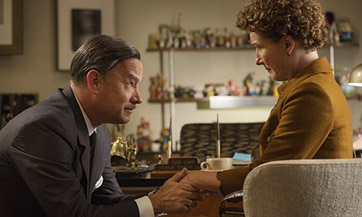The 400-Word Review: Saving Mr. Banks
By Sean Collier
December 23, 2013
At one point in Disney’s Saving Mr. Banks — and I’m attributing ownership of the film to the studio rather than the director deliberately — Emma Thompson’s P.L. Travers, exasperated at the treatment her work is receiving at the hands of the Mouse House, mutters that the script for Mary Poppins is “ghastly, empty pap.”
I hate to use a tired device, but there’s another screenplay at hand that could easily hold that label.
Directed by John Lee Hancock (The Blind Side) and written by Kelly Marcel and Sue Smith, Saving Mr. Banks purports to relay the behind-the-scenes drama that surrounded Mary Poppins — mainly, that Travers was obstinately opposed to nearly every idea presented by Disney’s creative team. In marketing and perhaps in spirit, it is a tête-à-tête between Travers and Walt Disney himself (Tom Hanks), as they struggle to strike a balance between the complex emotional core of the book and Disney’s, well, Disney-ness.
In practice, though, Saving Mr. Banks is an unpleasant slog through the worst aspects of Travers’ life. In bloated flashbacks, we revisit her upbringing in Australia; it seems that her early life was defined by a wistful devotion to a seemingly whimsical but deeply troubled father (Colin Farrell), and this informed her famous work.
If that doesn’t strike you as particularly watchable, that’s because it is not.
In adulthood, then, Travers is surly, disagreeable and often outright rude. We’re meant to be amused by seeing this sort of staunch British propriety in diametric opposition to the jovial familiarity of golden-age Disneyland, but the result instead is upsetting; there’s very little sympathizing with a character who stays nasty while an army attempts to please her.
The fault isn’t on Thompson or Hanks, who play the hands they’re dealt earnestly. The supporting cast, too, is game, including B.J. Novak and Jason Schwartzman as the Sherman brothers, the composers and lyricists behind Poppins. The scenes in California are tantalizing and visually fascinating, combining a “Mad Men”-esque attention to period detail with the technicolor playfulness of Disney’s studios; the Australian sequences, however, look like a dozen other uninteresting recent films (think, appropriately enough, Australia).
The fatal problem is the focus of the story, which lends itself only to consternation and woe; hardly appropriate for a reflection on Mary Poppins. There was an interesting story to be told here; the writers simply neglected to tell it.
Sean Collier is the Associate Editor of Pittsburgh Magazine and a member of the Broadcast Film Critics Association. Read more from Sean at pittsburghmagazine.com/afterdark




